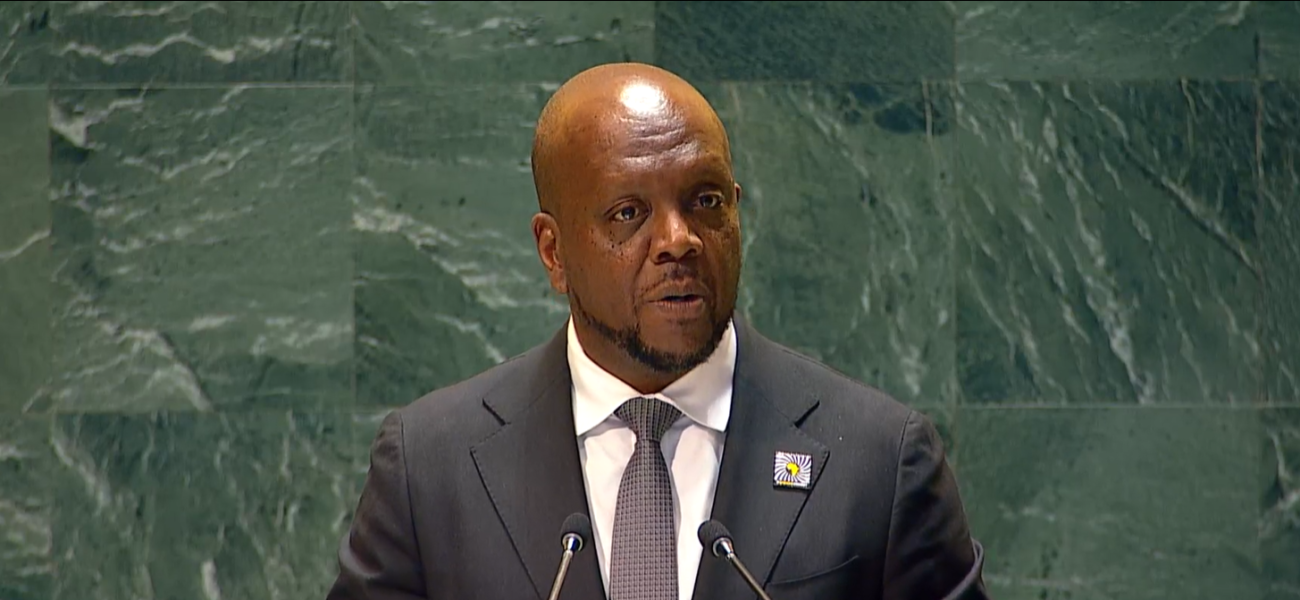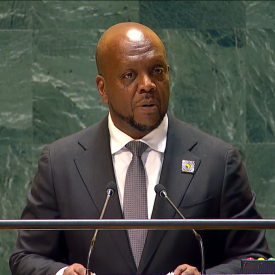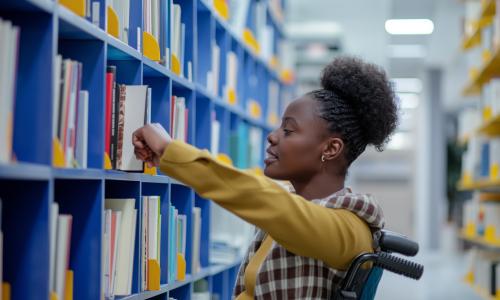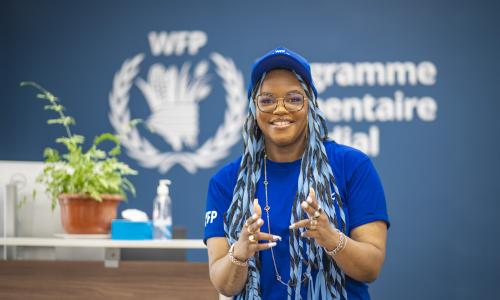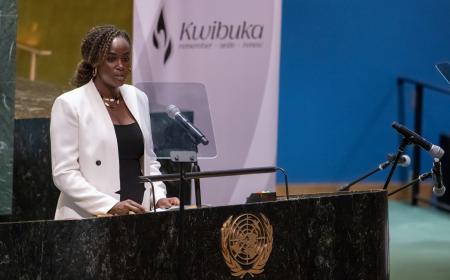The 4th Session of the Permanent Forum on People of African Descent serves as a platform for advocacy for the improvement of the lives and livelihoods of people of African descent. In 2025, Ambassador Martin Kimani of Kenya assumes the role of Chair of the Forum. He shared insights with Africa Renewal’s Kingsley Ighobor on what lies ahead under his leadership. Below are excerpts from the interview:
As the new Chair of this Forum, what are your top priorities for your tenure?
Well, I'm taking over from an amazing diplomat called June Soomer, and she has served with distinction in the last year. One of my immediate priorities is to try and match her levels of energy in terms of engaging with different activist groups and governments, and to take the agenda forward.
So, I have to be a great listener this year. I have to engage with our stakeholders in Africa, in the Caribbean, here in the United States, and everywhere there are large populations of people of African descent. And finally, a priority will be how to connect Africa more closely to its diaspora. And this will be building on work that I’ve done throughout my career. But this is a different Forum, and trying to find deeper, practical acts of solidarity between Africans and people of African descent is going to be at the top of my agenda.
Reparatory Justice is the African Union theme for 2025, and it is also one of the Forum’s priorities. How are you going about it?
You are right, the African Union theme this year reflects a newfound analysis and understanding that taking stock of the past and trying to repair the past—so as to have a better launching pad into the future that we want—is critical.
And so, the AU is engaging in this conversation and is finding other parts of the African world quite advanced in their conversation and understanding of reparatory justice—especially the Caribbean, and even here in the United States.
Broadly speaking, how do you get Africans in Africa and the African diaspora to work towards collective aspirations?
Well, this has always been the challenge. But, without going into it at great length, I think to be African and to identify as African is an act of solidarity. The paths to being African are so different. The paths that I’ve traveled to that word "African," from Nairobi to that idea of myself as African—the paths a Nigerian or Jamaican or an American travel to that word—are paths built on solidarity and common purpose.
That was the solidarity and common purpose that forged decolonization and anti-colonialism. It won us independence in Africa. It was the collaboration that built momentum towards civil rights in the United States and other parts of the West. And it was the solidarity and collaboration that brought down the apartheid regime.
So, we are building on a storied history of coming together to pursue great causes. And I think the Forum is a reflection of that century-old collaboration.
You were the Permanent Representative of Kenya to the United Nations here in New York. You were the representative of your country to UN-Habitat and the UN Environment Programme. How do you leverage your experience to strengthen the relationship between the Forum and international organizations to address economic justice, particularly the rising debt bedeviling the African continent?
Well, the Forum is an outgrowth of the Durban Conference. It is a Forum that many people have worked very hard to bring together. Its mandate is to listen to people of African descent, understand their conditions, and advise the Human Rights Council and the General Assembly on the steps that are to be taken.
So, our mandate is really to advise and engage UN institutions, and we are doing just that. Just last month [March], the Permanent Forum presented a paper on Haiti to the Human Rights Council and to the General Assembly. It has also been sent to different committees, from ECOSOC [Economic and Social Council] to the Security Council. It's an attempt to bridge Haiti’s history to its present difficult circumstances.
So we take it that our main job is to ensure that the United Nations and its organs, its agencies and programmes function to recognize the plight, the challenges, and also the opportunities of people of African descent, and to use their various instruments—reflecting the values of the United Nations—to make sure that this precious population of people is never left behind.
Your deep understanding of the inner workings of this system will definitely help you do your job.
You know, I cannot boast of having a deep understanding. Anyone who boasts of a deep understanding of the United Nations is usually proven wrong. But I do have my friends here.
I do have a string of responsibilities that I’ve had that better position me to be able to promote the work that we do as a Forum.
So what measures would you propose can be adopted by governments to address systemic racism, and how do you ensure that these measures are implemented at national levels?
There has been study after study, there’s so much research that has gone into the long-term effects of the enslavement of African people and colonialism. These effects range from the structures of the economy to the way the environment is affected, and to the psychosocial aspects of community living.
The United Nations, in pursuit of its mandate—which is peace and security, and also to make the conditions of life better (in other words, development)—is committed to helping the most vulnerable. So, the best thing we could have is have a disaggregated understanding of the conditions of people of African descent.
Then the various bodies, in pursuing their mandates, should ensure that they reach out, find where the people of African descent are, understand the conditions they’re in, and use their mandates to support, uplift, and collaborate with them.
Economic disparities are one of the challenges facing people of African descent. Do you have initiatives you can propose that can be adopted by countries to address this issue?
Now, we've had three sessions of the Permanent Forum —alternating between Geneva and New York each year. And in all of them, thousands of activists, researchers, and scholars present their ideas.
They have been very solid, compelling ideas about some of the measures that can be taken to improve the economic lot of people of African descent. So our job as a Forum is to listen, find those proposals, and find a way to channel them to the institutions that are supposed to be undertaking this work.
How challenging is digital inequity for people of African descent?
During this forum here in New York, there is a panel on artificial intelligence and digital justice, so I think this matter will be taken up robustly to understand—in this new age of large language models—what they have been trained on. Because essentially, they function on the basis of data sets that they’ve been trained on.
If they’ve been trained on data sets that are exclusionary or that, perhaps, have an understanding of people of African descent that is incorrect or even racist, the question then is: How will the LLM [Large Language Model] work?
Building on the resolutions that have been passed here—the American resolution, the Chinese resolution, and some of the agreements in the Summit of the Future—will, I hope, bring forth ideas about how the companies that are building LLMs, and the regulatory agencies overseeing them, will take the steps necessary to ensure that people of African descent are not left out. That their lives, their civilizations, and their ways of expressing themselves culturally, are not misunderstood and distorted in the process of developing artificial intelligence.
What legacy would you like to leave behind when your tenure is over?
Well, I know enough about geopolitics to understand that a good legacy today can become a bad legacy tomorrow. So I just hope to do the right thing, which is to listen with a keen ear—especially to listen not to the loudest or necessarily the most powerful, but to those, I think, who don’t have much of a chance to represent their views.
